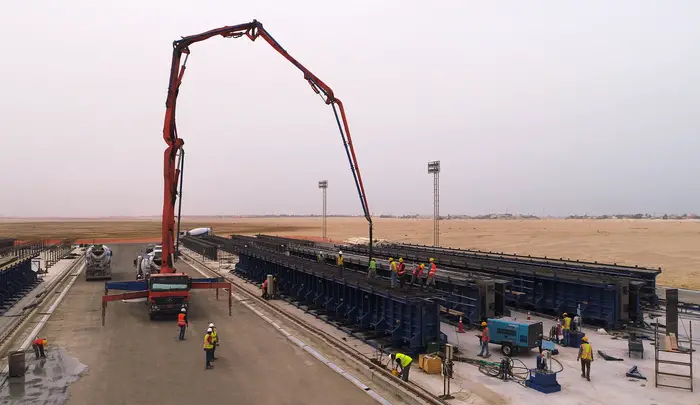Infrastructural projects in Kuwait are still in the focus of local governmental-backed investments. In order to improve connectivity regionally and globally projects in this sector are viewed as a state priority.
A huge number of major infrastructural and transportation projects are connected to the Kuwait Development Plan 2015-2020. As a part of this plan, a refurbishment of the Nawaseeb Road is ongoing with reconstruction of 45 km of the six lane dual carriageway (three in each direction) with a provision of the space for future upgrade with addition of one lane in each direction.
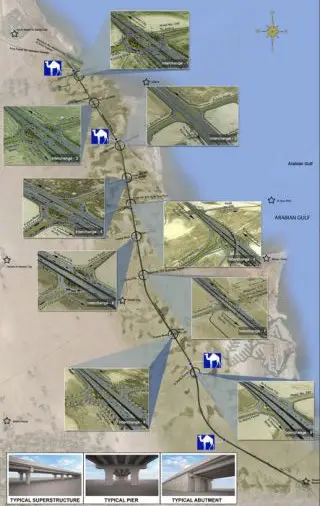 The goal was to improve access and safety on the roads, therefore the Nawaseeb Road corridor is upgraded to provide free flow by eliminating all existing U-turns and exchanging them into new roundabouts at all interchanges. This includes 18 elevated three lane bridges and 1 elevated two lane vehicular flyover. All these comprise 13 km of motorway on reinforced earth ramps and pertaining retaining walls. 4 elevated Camel Crossings with 3 km of roadways on reinforced earth ramps and associated retaining walls complete the project.
The goal was to improve access and safety on the roads, therefore the Nawaseeb Road corridor is upgraded to provide free flow by eliminating all existing U-turns and exchanging them into new roundabouts at all interchanges. This includes 18 elevated three lane bridges and 1 elevated two lane vehicular flyover. All these comprise 13 km of motorway on reinforced earth ramps and pertaining retaining walls. 4 elevated Camel Crossings with 3 km of roadways on reinforced earth ramps and associated retaining walls complete the project.
Eight bridges out of nine are designed using precast concrete T-beams, which are manufactured at a special production site beside the road and not far from the respective construction sites. The ninth bridge is a combination between precast concrete T-beams and cast in-situ box girders.
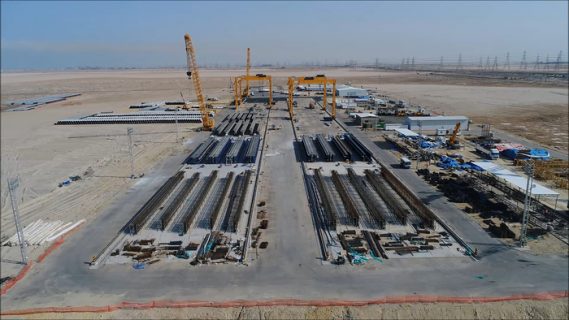 The precast elements are produced by ARAB CONTRACTORS, one of the leading construction companies in the Middle East and Africa. They are experts in a widely diversified field within the construction industry and cover from public buildings, bridges, roads, tunnels, airports, housing, water & sewage projects, wastewater treatment plants, power stations, dams, hospitals, sports buildings, restoration of monuments, irrigation, producing ready-mix concrete, shipbuilding, electromechanical projects, engineering consultancy, to manufacturing and assembly of steel structures.
The precast elements are produced by ARAB CONTRACTORS, one of the leading construction companies in the Middle East and Africa. They are experts in a widely diversified field within the construction industry and cover from public buildings, bridges, roads, tunnels, airports, housing, water & sewage projects, wastewater treatment plants, power stations, dams, hospitals, sports buildings, restoration of monuments, irrigation, producing ready-mix concrete, shipbuilding, electromechanical projects, engineering consultancy, to manufacturing and assembly of steel structures.
For the Nawaseeb project they invested in moulds for bridge girders from Tecnocom, Italy, a specialist for precast concrete element moulds and part of PROGRESS GROUP, a leader in precast technology. With a total of 8 moulds, several elements are produced simultaneously: in 4 moulds girders with a lengths of 40.5 meters are produced, the 4 other moulds produce elements which have a lengths of 44.5 m, so eight post tensioned elements can be produced daily.
The precast element production site, that is placed nearly half way from the two furthest construction sites offers the advantage that the elements can be easily transported to the respective location where they are installed. For the 9 bridges 820 girders have to be produced in total. 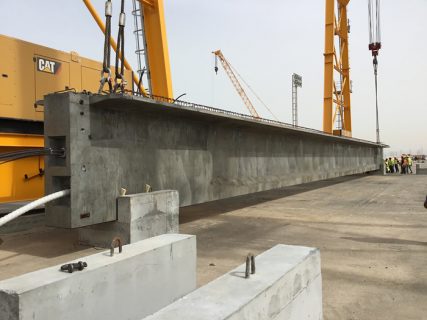
The bridges are designed with one additional lane, separated by barriers. This technical detail will allow converting bridges from three to four lane structures, which will allow the future widening of the motorway without additional structural works on the bridge. Building the bridges with precast concrete elements allows a very quick installation. As they are reinforced post-tensioned they offer a great resistance to heavy loads and the amount of concrete required is reduced.
The precast element production site was planned and built in partitions to arrange a smooth production process. In the first area the rebar cages with post-tensioning ducts and strands are produced and then the cages are placed into the moulds. At a next step, after the cages are inside the mould, the casting of the concrete into the T-beam shaped forms is taking place with an initial post-tensioning.
As the moulds made by Tecnocom are built in a modular way, each mould can be adjusted to produce the required length of the elements. They are also designed to be opened and closed hydraulically at the lateral shutters to increase productivity reducing the time for these operation drastically. The finished elements are then placed on u-chairs and the final post-tensioning takes place and the ducts are grouted. The elements are then stored before they are loaded and transported to the respective construction sites to be mounted at the respective bridge.
Due to the convenient location of the production site transport ways therefore have been minimized and the elements have only to be moved within a radius of 20 km. The whole project was started in 2017. Construction of the bridges, camel’s crossings and associated mechanically stabilized earth retaining walls will be carried out from February 2018 to April 2020.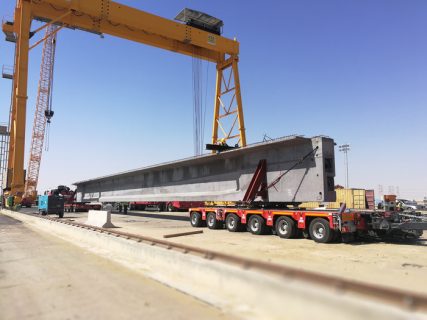
El-Moataz Bellah, Project Engineer at The Arab Contractors concludes: “The cooperation with Tecnocom worked very well. With them we had great partner in this project, who supported us with their knowledge in building moulds for high efficiency production.”
